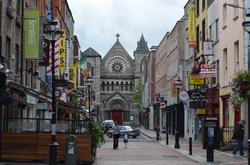
The flight to Atlanta, Georgia is seamless, although Delta worries about group three not having space enough for their baggage in the small 757 baggage compartments, I’m nearly last and there’s space easily available. I need to move a couple with a baby covered up by a sack so mom can do breast-feeding unobserved. Mom resettles baby to feed on the other side, and the baby is annoyed for several minutes. By takeoff, sunlight suddenly blasts in, past my attempt to sleep. I look up, and baby is blinking and rubbing her eyes. I close the window screen and get a very surprised look from the baby. She has big blue eyes which I mention to Mom, and say, oh, mama is going to have to lock you up from the boys. Mom laughs and tells me her older children had blue eyes but they changed to brown after the ninth month, so baby is obviously younger. Baby decides she likes me and wants to hold onto my fingers and shake it around. Later we drum on the table a little. She takes my credit brochure I pick up to check out the American Express/Delta deal, but baby wants to chew it and Momma wants to keep it out of her mouth. When I can retrieve it, I hide. Later, I unhook my watch so she can grab on. Baby’s so surprised that she can’t pull it to her mouth. She tries several times. I try moving it up and down and around but she won’t chase it, simply happy to wait. I try peekaboo with her but she doesn’t know that game yet. Momma’s surprised I’m getting so much attention—I’m not, I’m usually good with children but I don’t usually pay attention.
At the airport in Atlanta, Georgia the first Delta representative I ask about boarding pass, looks my flight up and prints it for me. I arrive in gate B, will depart, she believes, out of gate E. I take the walk through the underground tunnel beside the train rushing forward and back. Between gate B and gate C, there’s a long history of the area around Atlanta—the native American Cherokee, early settlers, the buy into the railroads since Atlanta (once called Marthaville named for a leader’s daughter) is a major crossroads for trade. Wealth grows. Slavery is minimal for the south because of few cotton plantations. Then the Civil War and the destruction of Atlanta for supplying the Confederate troops. Post war, many black universities spur on black business leadership, but the early optimism about rebuilding the city is dimmed as Crow laws and a policy of segregation persists and is reinforced. On through the civil rights movement as it unfolds and the affect of WWI and II builds commerce and Martin Luther King takes action. By the time I get to E and walk its three arms and return it is time for lunch at TGI Fridays.
I read the Penguin Guide to Irish Poets while listening to GPS and the many takes on US-China relationships, Syria, Turkey, the mass shootings in California and Nelson Mandela’s illness. I’m cold. Stiff. Eventually, I go for a cookie and another diet coke and find a nook by the bathrooms in the food circus with tulips on the tables, a window view of the streaming rain and black clouds, that’s where I am now. I’ve tried to write one of the poems playing at my ears and fall back into games but am bored. I’m two hours, forty-five minutes to boarding time.
 RSS Feed
RSS Feed